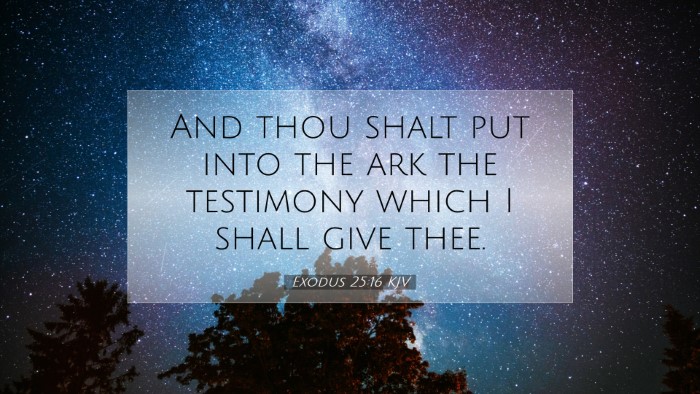Exodus 25:16 Commentary
Verse Text: "And thou shalt put into the ark the testimony which I shall give thee."
Introduction
This verse encapsulates a significant moment in the spiritual and communal life of Israel, where God instructed Moses to place the "testimony" within the Ark of the Covenant. This command underscores God's desire to dwell among His people and the importance of His law in their lives. In this commentary, we draw insights from esteemed public domain commentaries to explore the theological, historical, and practical implications of this verse.
The Ark of the Covenant
The Ark of the Covenant symbolizes God's presence, holiness, and covenant with His people. As highlighted in Albert Barnes' commentary, the ark was a sacred object that contained the tablets of the Law—representative of God's covenant obligations. Its construction reflects not only divine instruction but also the seriousness of obeying God's commands.
- Divine Instruction: The meticulous details surrounding the ark's construction emphasize the value God places on following His directives with precision and intention.
- Sign of God’s Presence: The ark served as a tangible representation of God's presence, reminding Israel of their unique covenant relationship with Him.
The Testimony: The Tablets of the Law
The "testimony" refers to the tablets of the Law, integral to Israelite identity and theology. Adam Clarke notes that these tablets represented God's moral standards and His covenant promises to Israel. Their placement in the ark signified the centrality of God's Law in the community.
- Moral Framework: The Law provided a moral framework for the Israelites, guiding their behavior and forming the foundation of their relationship with God.
- Symbol of Covenant: The tablets served as a physical reminder of Israel's obligations to God, marking the agreement between the Almighty and His people.
Theological Implications
The placement of the testimony in the ark holds numerous theological implications. Matthew Henry emphasizes the gravity of God's instructions, portraying them as expressions of divine authority over His people. This act sets a precedent for how God desires to communicate and interact with His creation.
- Authority of God’s Word: The central position of the Law within the ark underscores the supreme authority of the Scriptures in guiding believers' lives.
- Covenant Relationship: It highlights the notion that believers operate in a covenant relationship with God, where obedience is both a privilege and a responsibility.
- God's Desire for Fellowship: The instruction also reveals God's desire to dwell among His people, fostering intimacy through obedience to His word.
Practical Applications
For pastors, students, and theologians, Exodus 25:16 serves as a call to reflect on the role of God's Word in their lives and communities. As highlighted in various commentaries, the significance of placing the testimony in the ark can be applied to modern contexts in several ways:
- Prioritizing God’s Word: Just as the testimony was central in the ark, God's Word should take precedence in the lives of believers, guiding decisions and behaviors.
- Teaching and Discipleship: Pastors and leaders are reminded to prioritize teaching God's Word, ensuring that congregations understand and apply its truths.
- Moral and Ethical Living: The commitment to God’s statutes invites believers to live righteously, reflecting God's character in their daily interactions.
- Community and Unity: In a diverse body of believers, unity rooted in shared commitment to God's Word can achieve profound fellowship and mission.
Conclusion
Exodus 25:16 is more than a simple instruction; it is a profound statement about God's relationship with His people. The command to place the testimony in the ark serves as a timeless reminder of the necessity of God's Law in the life of the believer. By studying this verse, we draw insight and inspiration for our communal and individual faith journeys. Let us honor God's directives, knowing the importance they hold for our relationship with Him and one another.


